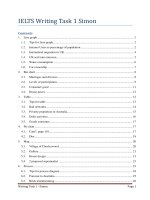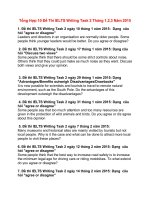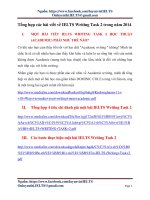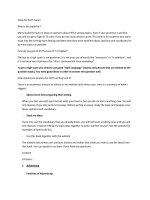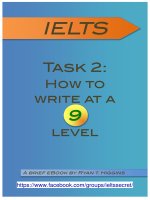Writing task 2 9.0 9999 artistic freedom (1)
Bạn đang xem bản rút gọn của tài liệu. Xem và tải ngay bản đầy đủ của tài liệu tại đây (180.99 KB, 8 trang )
Overall band score
9
9+9+9+9
See below C&C LR GRA
Model answer
WRITING TASK 2
You should spend about 40 minutes on this task.
Write about the following topic:
Some people think that artists should have total freedom to express any
thoughts and ideas.
To what extent do you agree or disagree with this statement?
Give reasons for your answer and include any relevant examples from your own
knowledge or experience.
Write at least 250 words.
Original answer It is often proposed that artists should be allowed to express what they feel and
believe without any fear of censorship or persecution. While acknowledging the
reasons for this thinking, I believe certain regulations on the freedom of artistic
expression are still necessary.
Granted, there are certain benefits of granting artists complete freedom to
express their feelings and beliefs. Proponents might argue freedom of expression
is the foundation of human rights, the root of human nature, and the mother of
truth. According to this belief, there should not be any limitations on the way
artists voice their opinions of issues, ranging from personal experiences and
emotions to socioeconomic and political matters. Aside from this, by letting artists
freely express themselves, not only would it help unleash their creative potential,
but it could also incentivize the culture of experimentation and risk-taking, which
is indeed of importance to innovation and social progress.
Notwithstanding the aforementioned arguments, I am convinced that some
restriction on artistic freedom is still needed. Perhaps the foremost reason would
be that freedom of expression does not equate to the right to offend or harm
others. In other words, artistic expression that promotes hate speech, violence, or
discrimination against a certain group of people should never be championed. For
example, the artwork of the Italian artist Max Papeschi that depicted Holocaust
victims as superheroes caused widespread outrage, with many saying that it
showed disrespect to the people involved. His work, as a consequence, was cut
out from many exhibitions.
In conclusion, although artistic freedom is indeed important, I would contend that
it should not come at the cost of causing harm or offense to others. For this
reason, some limitations on the expression of artists are warranted to ensure that
the arts serve their purpose of enriching society, instead of dividing it.
Overall band score
9
9+9+9+9
TR – Task Response nb – GRA and LR errors have not been corrected
Band score 9
You have a clear position throughout and all parts of the question are addressed.
Your position is coherent and well-argued. The ideas are relevant, extended, and
coherent.
I disagree 100% with your views – you’ve spent too long reading the Guardian and
the BBC. If the right is to not be offended, the effect would be that only one point
of view is ever allowed, as people are offended by the expression of a different
opinion. This is what we say in the “pandemic“, and as nearly always happens,
those trying to should down dissent were wrong about absolutely everything.
Someone’s right not to be offended should not take precedence over your right
to speak freely, even if you’re wrong.
In the tyrannical west nowadays, censorship is just used to shut down the
opposition – look at what happened when Tucker Carlson revealed the truth
about the J6 protests – there were calls to shut him down. No one made any
attempt to refute what he said – they just claimed to be offended by what is
basically the truth. People who have a religious objection to gay marriage are
accused of hate speech. People were arrested in Britain for displaying Russian
flags and accused of inciting racial hatred. Parents who object to their infant
school children being taught about gays and transsexuals are accused of “hate
speech”. This is what happens when you set the censorship bar so low that
you’re not allowed to offend anyone.
Better arguments would be that you’re not allowed to promote immoral
behaviour to children, or to ban porn and excessive violence, which you
mentioned.
Nevertheless, lots of people would agree with you, and you supported your
arguments clearly, which is why I gave you 9 for TR.
Advice On Brainstorming For Task 2
As you’re planning and writing your answer, remember to constantly
ask yourself if you’re answering the question. Check back to the
question a few times as you think of ideas to make sure they're
directly relevant.
Make sure your introduction directly addresses the
question.
Make sure your ideas address all parts of the question. If
the question asks for solutions, in the plural, you must
suggest at least 2.
Make sure your main ideas, as stated in the first sentence
of the main body paragraphs, are directly relevant to the
question.
Make sure your supporting ideas, which follow the main
ideas in the main body paragraphs, directly support the
main idea.
Be especially careful if you’ve answered similar question
before, as there will always be important differences.
Make sure your conclusion directly answers the question,
that it is consistent with the ideas in the main bodies, and
that it does not contradict the introduction.
It is often proposed that artists should be allowed to express what they feel and
believe without any fear of censorship or persecution. While acknowledging the
reasons for this thinking, I believe certain regulations on the freedom of artistic
expression are still necessary. [a]
Granted, there are certain benefits of granting artists complete freedom to
express their feelings and beliefs. [b]Proponents might argue freedom of
expression is the foundation of human rights, the root of human nature, and the
mother of truth. According to this belief, there should not be any limitations on
the way artists voice their opinions of issues, ranging from personal experiences
and emotions to socioeconomic and political matters. Aside from this, by letting
artists freely express themselves, not only would it help unleash their creative
potential, but it could also incentivize the culture of experimentation and risktaking, which is indeed of importance to innovation and social progress. [c]
Notwithstanding the aforementioned arguments, I am convinced that some
restriction on artistic freedom is still needed[d]. Perhaps the foremost reason
would be that freedom of expression does not equate to the right to offend or
harm others. In other words, artistic expression that promotes hate speech,
violence, or discrimination against a certain group of people should never be
championed. For example, the artwork of the Italian artist Max Papeschi that
depicted Holocaust victims as superheroes caused widespread outrage, with
many saying that it showed disrespect to the people involved. His work, as a
consequence, was cut out from many exhibitions. [e][f]
In conclusion, although artistic freedom is indeed important, I would contend that
it should not come at the cost of causing harm or offense to others. For this
reason, some limitations on the expression of artists are warranted to ensure that
the arts serve their purpose of enriching society, instead of dividing it. [g]
C&C - Cohesion and Coherence nb GRA and LR errors have not been corrected
Band score 9
Excellent cohesion and coherence throughout, with no errors.
The sentences have a natural flow characteristic of high band score answers.
Paragraphing for Task 2
I recommend you write 4 paragraphs as follows:
Write an introduction, that explains what the question is.
After reading the introduction, the reader should have a
good idea what the essay is about, and what your position
(opinion) is. It should be possible to write an introduction in
under 50 words. It is not necessary to write a long
background statement.
Write 2 main body paragraphs. This should allow you to
expand on the ideas sufficiently to persuade the examiner
that you’ve fully supported the main ideas. If you write 3
main bodies, it is more difficult to expand and support them
sufficiently to get a high score.
If it’s a two-part question, answer the questions in the order
they’re given and write one paragraph per question.
The main body paragraphs should be 100-120 words, and
each paragraph should have a clear topic sentence and 2 or
more supporting ideas which support the topic sentence with
reasons, evidence, and examples. Do not waste time with
lots of background information.
The topic sentences should directly address the question.
The conclusion should be consistent with the introduction
and the main ideas, and it should not introduce new ideas. It
should directly answer the question. Do not leave the
examiner in any doubt about whether you’ve answered the
question.
If you write a third paragraph in a discuss both sides question
to clarify your position, make sure that give a good reason to
reject one of the sides. If you just restated the original ideas
about one side, the examiner may decide you have covered
one side more than the other.
It is also ok to write a third body paragraph in a to what
extent question if you have main ideas which both agree and
disagree with the proposition. Avoid short paragraphs, with
under 70 words, as it may be difficult to show a clear central
topic in a short paragraph.
It is often proposed that artists should be allowed to express what they feel and
believe without any fear of censorship or persecution. While acknowledging the
reasons for this thinking, I believe certain regulations on the freedom of artistic
expression are still necessary.
Granted, there are certain benefits of granting artists complete freedom to
express their feelings and beliefs. [h]Proponents might argue freedom of
expression is [i]the foundation of human rights, the root of human nature, and the
mother of truth. According to this belief, [j]there should not be any limitations on
the way artists voice their opinions of issues, ranging from personal experiences
and emotions to socioeconomic and political matters[k]. Aside from this, by letting
artists freely express themselves, not only would it help unleash their creative
potential, but it could also incentivize the culture of experimentation and risktaking, which is indeed of importance to innovation and social progress. [l]
Notwithstanding the aforementioned arguments, I am convinced that some
restriction on artistic freedom is still needed[m]. Perhaps the foremost reason
would be that freedom of expression does not equate to the right to offend or
harm others[n]. In other words, [o]artistic expression that promotes hate speech,
violence, or discrimination against a certain group of people should never be
championed. For example, the artwork of the Italian artist Max Papeschi that
depicted Holocaust victims as [p]superheroes caused widespread outrage, with
many saying that it showed disrespect to the people involved[q]. His work, as a
consequence, was cut out from many exhibitions.
In conclusion, although artistic freedom is indeed important, I would contend that
it should not come at the cost of causing harm or offense to others. For this
reason, some limitations on the expression of artists are warranted to [r]ensure
that the arts serve their purpose of enriching society, instead of dividing it.
LR- - Lexical resource nb Some GRA errors have not been corrected
Band score 9
Vocabulary is used accurately with sufficienxt flexibility to show precise meaning,
with a wide variety of vocabulary, used accurately and with a high level of control.
Errors are rare and occur as minor slips.
It is often proposed that artists should be allowed to express what they feel and
believe without any fear of censorship or persecution. While acknowledging the
reasons for this thinking, I believe certain regulations on the freedom of artistic
expression are still necessary.
Granted, there are certain benefits of [s]granting artists complete freedom to
express their feelings and beliefs. Proponents might argue freedom of expression
is the foundation of human rights, the root of human nature, and the mother of
truth. According to this belief, there should not be any limitations on the way
artists voice their opinions of issues, ranging from personal experiences and
emotions to socioeconomic and political matters. Aside from this, by letting artists
freely express themselves, not only would it help unleash their creative potential,
but it could also incentivize the culture of experimentation and risk-taking, which
is indeed of importance to innovation and social progress.
Notwithstanding the aforementioned arguments, I am convinced that some
restriction on artistic freedom is still needed. Perhaps the foremost reason would
be that freedom of expression does not equate to the right to offend or harm
others. In other words, artistic expression that promotes hate speech, violence, or
discrimination against a certain group of people should never be championed[t].
For example, the artwork of the Italian artist Max Papeschi that depicted
Holocaust victims as superheroes caused widespread outrage, with many saying
that it showed disrespect to the people involved. His work, as a consequence,
was cut out from many exhibitions.
In conclusion, although artistic freedom is indeed important, I would contend that
it should not come at the cost of causing harm or offense to others. For this
reason, some limitations on the expression of artists are warranted to ensure that
the arts serve their purpose of enriching society, instead of dividing it.
GRA – Grammatical range and accuracy nb Some LR errors have
not been corrected
Band score 9
Grammar is used accurately a wide variety of structures, which should be good for
a band score 9.
Punctuation is use correctly throughout.
Appropriate structures are used throughout.
It is often proposed that artists should be allowed to express what they feel and
believe without any fear of censorship or persecution. While acknowledging the
reasons for this thinking, I believe certain regulations on the freedom of artistic
expression are still necessary.
Granted, there are certain benefits of granting artists complete freedom to
express their feelings and beliefs. Proponents might argue freedom of expression
is the foundation of human rights, the root of human nature, and the mother of
truth. According to this belief, there should not be any limitations on the way
artists voice their opinions of issues, ranging from personal experiences and
emotions to socioeconomic and political matters. Aside from this, by letting artists
freely express themselves, not only would it help unleash their creative potential,
but it could also incentivize the culture of experimentation and risk-taking, which
is indeed of importance to innovation and social progress.
Notwithstanding the aforementioned arguments, I am convinced that some
restriction on artistic freedom is still needed. Perhaps the foremost reason would
be that freedom of expression does not equate to the right to offend or harm
others. In other words, artistic expression that promotes hate speech, violence, or
discrimination against a certain group of people should never be championed. For
example, the artwork of the Italian artist Max Papeschi that depicted Holocaust
victims as superheroes caused widespread outrage, with many saying that it
showed disrespect to the people involved. His work, as a consequence, was cut
out from many exhibitions.
In conclusion, although artistic freedom is indeed important, I would contend that
it should not come at the cost of causing harm or offense to others. For this
reason, some limitations on the expression of artists are warranted to ensure that
the arts serve their purpose of enriching society, instead of dividing it.


